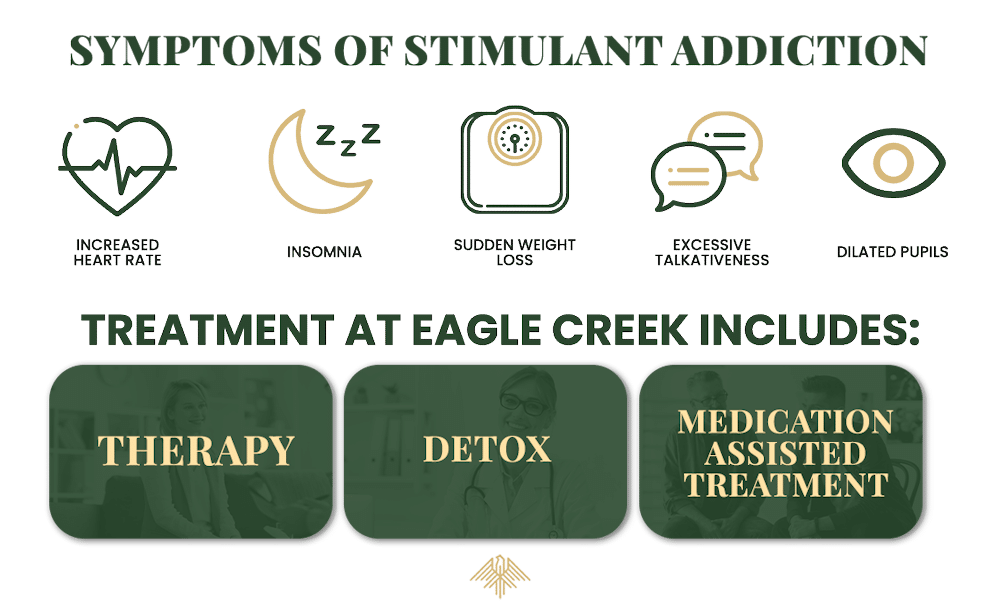Stimulant Addiction Treatment
Stimulants are a class of drugs becoming more and more common to the everyday individual. Whether prescribed by a doctor or used on a recreational basis, stimulants are more prevalent in today’s society than ever.
Often, using stimulants can lead to stimulant addiction, and those who were taking what may have been a controlled dosage are experiencing the perils of addiction. Co-occurring mental health conditions (such as bipolar disorder) may accompany stimulant addiction, and addressing these conditions is crucial for comprehensive treatment and better recovery outcomes.
If you are struggling with addiction, hope is not completely lost. There are a variety of options for stimulant addiction rehab. Therapy and holistic treatments are among the options available for stimulant addiction treatment in Idaho.
Stimulant drugs are a category of substances that elevate certain types of human activity, both physically and mentally. They increase alertness, attention, and energy and elevate blood pressure, heart rate, and breathing rate. Examples of stimulants include drugs like caffeine, nicotine, amphetamines, and cocaine. While some stimulants have legal medical uses, others are illegal due to their high potential for abuse and addiction.
Common Types of Stimulants
Stimulants, sometimes referred to as ‘uppers’, temporarily enhance alertness and energy. The most commonly used stimulants are caffeine and nicotine, which are most ubiquitous in beverages and cigarettes (respectively). Prescription stimulants such as Adderall and Ritalin are typically used to treat attention deficit hyperactivity disorder (ADHD). Illicit stimulants include substances like cocaine, methamphetamine, and ecstasy (MDMA), which are frequently misused for their euphoric effects.
How Does Stimulant Abuse Impact the Brain and Body?

Stimulant abuse can lead to serious health problems. Excessive stimulation of the nervous system can result in physical side effects, including increased heart rate, high blood pressure, and potential damage to the cardiovascular system. Prolonged use can lead to malnutrition, due to decreased appetite. Sleep disorders can arise due to the disruption of natural sleep patterns.
In terms of mental effects, abuse of these substances can lead to heightened anxiety, paranoia, and even severe psychiatric disorders over time. Stimulant abuse can exacerbate existing mental health conditions (such as bipolar disorder), making comprehensive treatment essential for complete recovery.
Stimulant abuse can often be identified through a range of physical and behavioral symptoms. Physically, individuals may exhibit restlessness, insomnia, rapid weight loss, and dilated pupils. They might also have physical health issues such as increased heart rate, high blood pressure, and (in severe cases) seizures.
A person abusing stimulants may demonstrate hyperactivity, euphoria, excessive talkativeness, and an increased sense of self-confidence. However, as the effects of the stimulant wear off, they may experience mood swings, anxiety, and depression. It’s also important to note that these symptoms can vary greatly depending on the type and quantity of stimulant used.
Stimulant drugs, such as cocaine, methamphetamine, and some prescription drugs, can significantly impact the human body and mind. These substances increase dopamine, norepinephrine, and other neurotransmitters in the brain, leading to heightened alertness, attention, and energy. However, misuse of stimulants can result in negative effects that include:
- Increased heart rate
- High blood pressure
- Insomnia
- Anxiety
Long-term use may lead to severe health issues such as heart disease, stroke, and mental disorders like paranoia or psychosis.

Contact Eagle Creek Ranch
Recovery Today!
Why Wait? Find The Help You Need By Reaching Out To Us Today! Our Admissions Team Is Standing By.
Withdrawal Symptoms of Stimulant Abuse
Stimulant abuse can lead to a host of withdrawal symptoms when usage is ceased or significantly reduced. These symptoms may include:
- Fatigue
- Depression
- Disturbed sleep patterns
- Intense craving
- Muscle pain
- Stomach discomfort
- Agitation
- Paranoia
- Hallucinations
It’s crucial to seek professional help for stimulant withdrawal to manage these symptoms effectively and safely.

How Do People Develop Stimulant Drug Addiction?
Stimulant drug addiction often develops as individuals repeatedly use the substances to achieve a heightened state of focus, energy, or euphoria. Individuals with co-occurring mental health conditions, such as eating disorders, may be at higher risk of developing stimulant addiction. With prolonged use, the body and brain adapt to accommodate the presence of the stimulants to work properly. This means the body will crave the stimulant when not in regular use, simply because it requires it to work normally.
Tolerance can build over time, requiring larger doses to achieve the same effects, which can further accelerate the cycle of addiction. It’s crucial to understand that addiction is a complex disease, not a moral failing. It often requires professional help and specialized stimulant addiction treatment support for recovery.
Who is Most at Risk of Stimulant Abuse?
Individuals most at risk for stimulant abuse include adolescents and young adults, particularly those immersed in high-pressure environments like competitive schools or jobs. There’s also a higher risk among those with a history of substance abuse or mental health disorders. Stimulant abuse can also be prevalent among individuals seeking to improve athletic performance or lose weight. Many cases of addiction go unreported due to stigma around addiction and the normalization of using the substances.
How Stimulant Addiction Treatment Works
Stimulant addiction is a serious and often debilitating condition. But with the right treatment, recovery is possible. It is crucial to recognize and address co-occurring mental health conditions to ensure comprehensive treatment and better recovery outcomes.
After detox, therapeutic approaches are pursued. These include therapy modalities like cognitive-behavioral therapy (CBT) as well as holistic methods. These are designed to change the individual’s behaviors and attitudes toward drug use. They also help to teach healthy life skills, then continue with long-term follow-up to prevent relapse. Treatment often includes a combination of medical and therapeutic strategies.
Residential treatment, also known as inpatient rehab, is an intensive program designed to treat serious addictions. Inpatient treatment often includes addressing co-occurring mental health conditions to ensure comprehensive care. It typically involves a structured schedule of individual and group therapy sessions, educational lectures, and supervised recreational activities. Patients live within the facility and are monitored 24/7 to ensure a safe, drug-free environment. Medical supervision aids in managing withdrawal symptoms and any potential complications.
How Does Medical Detox for Stimulant Addiction Work?
Many people avoid receiving treatment for stimulant addiction out of fear of the symptoms of withdrawal. However, medical detoxification for stimulant addiction works by systematically and safely withdrawing the individual from the drug. The uncomfortable and potentially dangerous withdrawal symptoms that may occur are monitored and alleviated in real-time by a medical professional. They may administer medications to alleviate withdrawal symptoms such as anxiety, agitation, and intense cravings. They’re also available to stop adverse effects from intensifying and spiraling into more urgent (or dangerous) effects on the individual’s body.
Medications used in detox settings help stabilize the individual’s physical condition and make them more comfortable. But alongside medication, the detox process also involves comprehensive psychological support and counseling to help the individual navigate through the emotional aspects of withdrawal. This integrated approach aims to provide a solid foundation for ongoing addiction treatment and recovery. The person isn’t distracted by side effects at the crucial beginning of addiction treatment, nor are they tempted to return to drug abuse to alleviate the discomfort of withdrawal.
Why is Treatment for Stimulant Addiction Necessary?
Specialized stimulant addiction treatment at treatment centers may seem like an unnecessary or excessive step to healing from addiction. But stimulant use disorders frequently require expertise that non-professionals can’t supply. A person trying to heal from substance abuse on their own may not be able to readily access treatment options like family therapy or medication to help treat withdrawal symptoms. It may be difficult to find resources specific to addiction treatment for stimulants, such as support groups. Alcohol and opioid addiction resources can frequently be easier to locate than those for stimulant addiction. A helping hand or hub of information can be invaluable when starting in recovery.
Individualized treatment for stimulant addiction is crucial because it acknowledges the unique circumstances, needs, and recovery goals of each person. Individualized treatment plans can address co-occurring mental health conditions to ensure comprehensive care. Addiction is a complex disorder, often interwoven with mental health issues, social factors, and individual health conditions.
A one-size-fits-all approach fails to address these intricacies, potentially leading to ineffective treatment and a higher risk of relapse. Conversely, tailored treatment plans incorporate therapies and strategies that resonate with the individual’s experiences, boosting the likelihood of a successful, sustained recovery.
Receive Help for Drug Addiction at Eagle Creek Ranch Recovery

At Eagle Creek Ranch Recovery, we offer individuals struggling with stimulant addiction comprehensive, compassionate care. Through a combination of therapy, counseling, and medical intervention, we empower people to recover. Our team of healthcare professionals is committed to providing personalized, patient-centered care. We recognize that each person’s journey to recovery is unique, therefore their treatment should reflect that. If you or a loved one would like to find out more, contact us here.

Clinical Director
Kendall Maloof is the clinical director at Eagle Creek Ranch Recovery. She is a licensed marriage and family therapist and has held multiple leadership roles before settling here at Eagle Creek Ranch Recovery. Kendall received her master’s degree in marriage and family therapy from the Chicago School of Professional Psychology in 2016. Her career in mental and behavioral health began in 2014 when she took up internships in both the nonprofit and for profit sectors. She interned at multiple reputable companies, such as The Living Success Center and 449 Recovery in California.
In 2019, Kendall became the clinical director of Sunsets Recovery for Woman, a dual diagnosis program in southern California. Kendall is a natural leader. She has an incredible ability to problem solve and stay calm in any situation. Kendall never fails to show up when she is needed, and her calm demeanor makes her team and clients feel at ease. Eagle Creek Ranch Recovery is proud to have Kendall as our clinical director.


